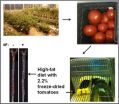Brain-mapping increases understanding of alcohol's effects on first-year college students
2013-03-19
(Press-News.org) A research team that includes several Penn State scientists has completed a first-of-its-kind longitudinal pilot study aimed at better understanding how the neural processes that underlie responses to alcohol-related cues change during students' first year of college.
Anecdotal evidence abounds attesting to the many negative social and physical effects of the dramatic increase in alcohol use that often comes with many students' first year of college. The behavioral changes that accompany those effects indicate underlying changes in the brain. Yet in contrast to alcohol's numerous other effects, its effect on the brain's continuing development from adolescence into early adulthood -- which includes the transition from high school to college -- is not well known.
Penn State psychology graduate student Adriene Beltz, with a team of additional researchers, investigated the changes that occurred to alcohol-related neural processes in the brains of a small group of first-year students.
Using functional magnetic resonance imaging (fMRI) and a data analysis technique known as effective connectivity mapping, the researchers collected and analyzed data from 11 students, who participated in a series of three fMRI sessions beginning just before the start of classes and concluding part-way through the second semester.
"We wanted to know if and how brain responses to alcohol cues -- pictures of alcoholic beverages in this case -- changed across the first year of college," said Beltz, "and how these potential changes related to alcohol use. Moreover, we wanted our analysis approach to take advantage of the richness of fMRI data."
Analysis of the data collected from the study participants revealed signs in their brains' emotion processing networks of habituation to alcohol-related stimuli, and noticeable alterations in their cognitive control networks.
Recent studies have indicated that young adults' cognitive development continues through the ages of the mid-20s, particularly in those regions of the brain responsible for decision-making or judgment-related activity -- the sort of cognitive "fine tuning" that potentially makes us, in some senses, as much who we are (and will be) as any other stage of our overall development.
Other recent studies suggest that binge drinking during late adolescence may damage the brain in ways that could last into adulthood.
Beltz's study indicates that connections among brain regions involved in emotion processing and cognitive control may change with increased exposure to alcohol and alcohol-related cues. Those connections also may influence other parts of the brain, such as those still-developing regions responsible for students' decision-making and judgment abilities.
"The brain is a complex network," Beltz said. "We know that connections among different brain regions are important for behavior, and we know that many of these connections are still developing into early adulthood. Thus, alcohol could have far-reaching consequences on a maturing brain, directly influencing some brain regions and indirectly influencing others by disrupting neural connectivity."
While in an fMRI scanner at the Penn State Social, Life, and Engineering Sciences Imaging Center, students participating in the study completed a task: responding as quickly as possible, by pressing a button on a grip device, to an image of either an alcoholic beverage or a non-alcoholic beverage when both types of images were displayed consecutively on a screen. From the resulting data, effective connectivity maps were created for each individual and for the group.
Examining the final maps, the researchers found that brain regions involved in emotion-processing showed less connectivity when the students responded to alcohol cues than when they responded to non-alcohol cues, and that brain regions involved in cognitive control showed the most connectivity during the first semester of college. The findings suggest that the students needed to heavily recruit brain regions involved in cognitive control in order to overcome the alcohol-associated stimuli when instructed to respond to the non-alcohol cues.
"Connectivity among brain regions implicated in cognitive control spiked from the summer before college to the first semester of college," said Beltz. "This was particularly interesting because the spike coincided with increases in the participants' alcohol use and increases in their exposure to alcohol cues in the college environment. From the first semester to the second semester, levels of alcohol use and cue exposure remained steady, but connectivity among cognitive control brain regions decreased. From this, we concluded that changes in alcohol use and cue exposure -- not absolute levels -- were reflected by the underlying neural processes."
Although the immediate implications of the pilot study for first-year students are fairly clear, there are still a number of unanswered questions related to alcohol's longer-term effects on development, for college students after their first year and for those same individuals later in life.
To begin exploring those potential long-term effects, Beltz has planned a follow-up study to track a larger number of participants over a greater length of time.
###
Other scientists involved in this research were Kathleen Gates, Virginia Polytechnic Institute and State University, who was research associate professor of human development and family studies at Penn State at the time of the study; Carmen Pulido, University of California, San Diego; Robert Turrisi, professor of biobehavioral health, Penn State; and these researchers affiliated with Penn State's Huck Institutes of the Life Sciences: Anna Engels, assistant director of the Social, Life, and Engineering Sciences Imaging Center; Peter Molenaar, Distinguished Professor of Human Development; Sheri Berenbaum, professor of psychology and pediatrics; Rick Gilmore, associate professor of psychology; and Stephen Wilson, assistant professor of psychology.
The research was supported in part by the National Institute on Alcohol Abuse and Alcoholism and the National Science Foundation.
Read a more detailed article http://www.huck.psu.edu/about/news-archive/beltz-et-al-fmri-effective-connectivity-mapping about this research, including a discussion of the methodology, on the website of the Huck Institutes of the Life Sciences. END
ELSE PRESS RELEASES FROM THIS DATE:
Conscientious people are more likely to have higher GPAs
2013-03-19
Conscientious people are more likely to have higher grade point averages, according to new research from psychologists at Rice University.
The paper examines previous studies that research the link between the "Big Five" personality traits –agreeableness, conscientiousness, extraversion, neuroticism and openness to experience – and college grade point average. It finds that across studies, higher levels of conscientiousness lead to higher college grade point averages. It also shows that five common personality tests are consistent in their evaluation of the "Big Five" ...
UCLA researchers create tomatoes that mimic actions of good cholesterol
2013-03-19
UCLA researchers have genetically engineered tomatoes to produce a peptide that mimics the actions of good cholesterol when consumed.
Published in the April issue of the Journal of Lipid Research and featured on the cover, their early study found that mice that were fed these tomatoes in freeze-dried, ground form had less inflammation and plaque build-up in their arteries.
"This is one of the first examples of a peptide that acts like the main protein in good cholesterol and can be delivered by simply eating the plant," said senior author Dr. Alan M. Fogelman, executive ...
High-carb intake in infancy has lifelong effects, UB study finds
2013-03-19
BUFFALO, N.Y. – Consumption of foods high in carbohydrates immediately after birth programs individuals for lifelong increased weight gain and obesity, a University at Buffalo animal study has found, even if caloric intake is restricted in adulthood for a period of time.
The research on laboratory animals was published this month in the American Journal of Physiology: Endocrinology and Metabolism; it was published online in December.
"This is the first time that we have shown in our rat model of obesity that there is a resistance to the reversal of this programming ...
Dartmouth researchers invent real time secondhand smoke sensor
2013-03-19
Making headway against a major public health threat, Dartmouth College researchers have invented the first ever secondhand tobacco smoke sensor that records data in real time, a new study in the journal Nicotine and Tobacco Research shows.
The researchers expect to soon convert the prototype, which is smaller and lighter than a cellphone, into a wearable, affordable and reusable device that helps to enforce no smoking regulations and sheds light on the pervasiveness of secondhand smoke. The sensor can also detect thirdhand smoke, or nicotine off-gassing from clothing, ...
Immigration reform needs to address access to health care
2013-03-19
With comprehensive immigration reform a priority for President Obama and gaining bipartisan and public support, there is a need and an opportunity to consider how the millions of undocumented immigrants should be integrated into our health care system, concludes a new report from The Hastings Center.
The report is the executive summary of the findings of a Hastings Center project that explored ethical, legal, and policymaking challenges that arise when undocumented immigrants living in the United States need medical care. It can be found on the project Web site, http://www.undocumentedpatients.org/executive-summary. ...
Researchers identify a promising target for Multiple Sclerosis treatments
2013-03-19
A team of basic and clinical scientists led by the University of Montreal Hospital* Research Centre's (CRCHUM) Dr. Nathalie Arbour has opened the door to significantly improved treatments for the symptoms of Multiple Sclerosis (MS). In a study selected as among the top 10% most interesting articles published in the Journal of Immunology, the team identifies the elevated presence in MS patients of a type of white blood cell (CD4 T cell) that expresses NKG2C, a highly-toxic molecule harmful to brain tissues.
In close collaboration with clinicians at the University of Montreal ...
An oxygen-poor 'boring' ocean challenged evolution of early life
2013-03-19
RIVERSIDE, Calif. — A research team led by biogeochemists at the University of California, Riverside has filled in a billion-year gap in our understanding of conditions in the early ocean during a critical time in the history of life on Earth.
It is now well accepted that appreciable oxygen first accumulated in the atmosphere about 2.4 to 2.3 billion years ago. It is equally well accepted that the build-up of oxygen in the ocean may have lagged the atmospheric increase by well over a billion years, but the details of those conditions have long been elusive because of ...
Petroleum use, greenhouse gas emissions of automobiles could drop 80 percent by 2050
2013-03-19
WASHINGTON -- A new National Research Council report finds that by the year 2050, the U.S. may be able to reduce petroleum consumption and greenhouse gas emissions by 80 percent for light-duty vehicles -- cars and small trucks -- via a combination of more efficient vehicles; the use of alternative fuels like biofuels, electricity, and hydrogen; and strong government policies to overcome high costs and influence consumer choices. While achieving these goals will be difficult, improving technologies driven by strong and effective policies could make deep reductions possible.
"To ...
Gone but not forgotten: Yearning for lost loved ones linked to altered thinking about the future
2013-03-19
People suffering from complicated grief may have difficulty recalling specific events from their past or imagining specific events in the future, but not when those events involve the partner they lost, according to a new study published in Clinical Psychological Science, a journal of the Association for Psychological Science.
The death of a loved one is among the most painful and disruptive experiences a person can face. For most, the grief subsides over time. But those who suffer from complicated grief continue to yearn for the lost loved one, experience waves of painful ...
Elite athletes also excel at some cognitive tasks
2013-03-19
CHAMPAIGN, Ill. — New research suggests that elite athletes – Olympic medalists in volleyball, for example – perform better than the rest of us in yet another way. These athletes excel not only in their sport of choice but also in how fast their brains take in and respond to new information – cognitive abilities that are important on and off the court.
The study, of 87 top-ranked Brazilian volleyball players (some of them medalists in the Beijing and London Olympics) and 67 of their nonathletic contemporaries, also found that being an athlete minimizes the performance ...



